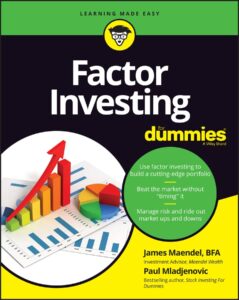Today, Feathered Quill reviewer Ellen Feld is talking with James Maendel, co-author of Factor Investing For Dummies.
FQ: Tell our readers a little about yourself. Your background, your interests, and how this led to writing a book?
MAENDEL: As a financial advisor over the last two decades I've learned that, more than any other factor, it is a person's behavior that determines their ability to grow wealth and financial independence. Most investors are caught somewhere between wanting to "beat the market" and hiding their money in low-return "safe" places like savings accounts and bond funds and worse, flip flopping objectives depending on economic conditions. It's a well-documented problem where the majority of the investing public buys high and panic sells low, and over time they vastly underperform even low rated mutual funds. Incidentally, this is why I chose BFA (Behavioral Financial Advisor) as the credential to appear after my name on the cover. I hold many professional designations and licenses, but I believe this is the most important and represents perhaps the biggest breakthrough in financial theory in my lifetime. Financial planning was a big advance 20 or 25 years ago. Behavioral financial advice is at least as big. It is that revolutionary.
FQ: Have you always enjoyed writing or is it something you’ve discovered recently?
MAENDEL: I've contributed to several books in the past including a chapter in The Corporate Executives Guide to General Investing (Business Expert Press March 18/2022) published earlier this year, but I've never taken on a full book. My co-author Paul Mladjenovic who's been a friend for many years, encouraged me to see that I have a unique viewpoint to contribute. He was a fantastic mentor.
FQ: Tell us a little about your book – a brief synopsis and what makes your book unique.
MAENDEL: Most books on personal investing focus on market timing or individual stock and bond selection in order to try to maximize performance. Factor Investing For Dummies is a different approach that applies a mix of historically proven metrics to a diversified portfolio of stocks that academic research has shown to outperform over time in a robust set of market conditions, decades and even in the markets of different countries. In short, it's designed to help save you and your financial advisor time, fees, taxes (by minimizing portfolio turnover), grief and sleepless nights, while helping you reach your retirement and financial independence goals more reliably using proven methodologies.
FQ: What was the impetus for writing your book?

MAENDEL: I've built a large network of investment advisors, professional investors and investing aficionados as an investment advisor. In our conversations investor behavior is a recurring theme. I wanted to explore a methodology for investors to use when working with their advisors or (if they have the time and inclination) by themselves that could best combine the impetus to outperform or "beat the market" without having to engage in what's called "market timing" which can often leave an investor who's hiding in cash behind as the market rallies. We're seeing this yet again right now in October of 2022.
FQ: Please give our readers a little insight into your writing process. Do you set aside a certain time each day to write, only write when the desire to write surfaces, or ?
MAENDEL: I've really enjoyed the writing process and am somewhat surprised at how much I miss it now that the book is finished!
I'm a big fan of setting 2-4 hours aside daily, regardless of whether the muses are inspiring you or not. Even though I'm writing technical books, the process is the same and writer's block is very real. I set aside the time and if I get stuck, I doodle, bounce ideas off a friend or do whatever I have to in order to start writing again.
FQ: The genre of your book is Self Help and Personal Growth. Why this genre?
MAENDEL: Self Help and Personal Growth is my genre, of which investing is just a component. Ultimately I want to help people live richer, more fulfilling lives by putting proven systems in place that can save time and yet are robust and flexible enough to handle whatever life throws at them.
I love the phase "simplicity is the ultimate sophistication", and this applies especially to the complex and jargon-filled world of finance where everyone is selling something and most actually have an interest in making things sound more complicated so that you don't understand it and are forced to rely on (and pay) them.
Condensing financial concepts into simple, readable paragraphs is a huge challenge and something I enjoy. It ultimately helps me to better connect with the clients I meet on a daily basis.
FQ: Do you have any plans to try writing a book in a different genre? If so, which genre and why?
MAENDEL: I've always admired polymaths and the "renaissance mind" holistic and interconnected approach to life of individuals whose knowledge spans a wide number of subjects, able to draw on complex bodies of knowledge to solve specific problems and understand life. I was inspired by an old book called the The Pinball Effect (by James Burke) which shows that the factors that lead to discoveries and inventions are so interconnected, unpredictable and often accidental that their history is more like the path of a pinball caroming about its table than a linear chain of events. The book, for instance, owes its existence to German jeweler Johannes Gutenberg's getting the date wrong one day in the fifteenth century. I'd like to write something similar exploring the interconnectedness between financial, insurance, investing, economic growth, wealth building and personal fulfillment concepts.
FQ: Who are your favorite authors?
MAENDEL: My favorite financial genre authors are right on my bookshelf. They include Edward Chancellor (Devil Take the Hindmost) who writes about financial bubbles and the psychology of crowds, Jason Zweig (Your Money and Your Brain) exploring how your amygdala and cave person brain hurts you while trying to "save" you when it comes to modern life and investing, Kent Nerburn who wrote Letters to My Son exploring what makes a meaningful life, and Jim Roger's Investment Biker-a former hedge fund manager who rode his motor bike not once but twice around the world observing globalism, capital flows, poverty and the folks that actually make things first hand.
As an author/writer, what famous author (living or dead), would you like to have dinner with, and why?
MAENDEL: The famous novelist Aleksandr Solzhenitsyn. Not only could I practice my 3rd year college level Russian on him, but I'd love to hear his analysis of what's going on in the increasingly totalitarian West right now, and the future of human freedom (If I could get him to endorse my book, that would be priceless:)
FQ: Did your family & friends encourage you to write your book?
MAENDEL: Yes, my wife and family, and the editorial staff were incredibly supportive during the process and gave some constructive advice I didn't necessarily want to hear at the time, but it made the book much better. I love that my kids have seen the entire book writing process first hand. They realize there is system to it and that it can be broken down into manageable chunks. They are now inspired to write books of their own!


Interesting approach and interview. Another book added to my reading pile!
ReplyDelete